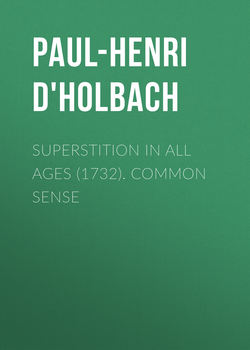Читать книгу Superstition In All Ages (1732). Common Sense - Paul-Henri d'Holbach - Страница 60
COMMON SENSE
LVII. – THE VANITY OF THEOLOGICAL CONSOLATIONS IN THE TROUBLES OF THIS LIFE. THE HOPE OF A HEAVEN, OF A FUTURE LIFE, IS BUT IMAGINARY
ОглавлениеWhen we ask why, under a good God, so many are wretched, we are reminded that the present world is but a pass-way, designed to conduct man to a happier sphere; we are assured that our sojourn on the earth, where we live, is for trial; they silence us by saying that God would not impart to His creatures either the indifference to the sufferings of others, or the infinite happiness which He reserved for Himself alone. How can we be satisfied with these answers?
1. The existence of another life has no other guaranty than the imagination of men, who, in supposing it, have but manifested their desire to live again, in order to enter upon a purer and more durable state of happiness than that which they enjoy at present.
2. How can we conceive of a God who, knowing all things, must know to their depths the nature of His creatures, and yet must have so many proofs in order to assure Himself of their proclivities?
3. According to the calculations of our chronologists, the earth which we inhabit has existed for six or seven thousand years; during this time the nations have, under different forms, experienced many vicissitudes and calamities; history shows us that the human race in all ages has been tormented and devastated by tyrants, conquerors, heroes; by wars, inundations, famines, epidemics, etc. Is this long catalogue of proofs of such a nature as to inspire us with great confidence in the hidden views of the Divinity? Do such constant evils give us an exalted idea of the future fate which His kindness is preparing for us?
4. If God is as well-disposed as they assure us He is, could He not at least, without bestowing an infinite happiness upon men, communicate to them that degree of happiness of which finite beings are susceptible? In order to be happy, do we need an Infinite or Divine happiness?
5. If God has not been able to render men happier than they are here below, what will become of the hope of a Paradise, where it is pretended that the elect or chosen few will rejoice forever in ineffable happiness? If God could not or would not remove evil from the earth (the only sojourning place we know of), what reason could we have to presume that He can or will remove it from another world, of which we know nothing? More than two thousand years ago, according to Lactance, the wise epicure said: "Either God wants to prevent evil, and can not, or He can and will not; or He neither can nor will, or He will and can. If He wants to, without the power, He is impotent; if He can, and will not, He is guilty of malice which we can not attribute to Him; if He neither can nor will, He is both impotent and wicked, and consequently can not be God; if He wishes to and can, whence then comes evil, or why does He not prevent it?" For more than two thousand years honest minds have waited for a rational solution of these difficulties; and our theologians teach us that they will not be revealed to us until the future life.
